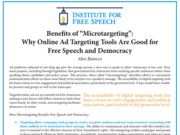The deceptively-named “Honest Ads Act” is a proposal in Congress that would increase regulations for paid political and issue advertising on the Internet – including communications by organizations engaged in nonpartisan voter education, registration, and get out the vote efforts. In order to run such ads, groups would be forced to comply with complex and confusing government reporting requirements and include an inflexible disclaimer on their online ads. Affected groups would be susceptible to politically motivated complaints, investigations, and legal liability if they are unable to correctly discern whether and how they are regulated under these complicated laws. These costs would negate many of the Internet’s benefits in enabling low-cost, grassroots campaigns to effect political and social change, forever changing the Internet as we know it.
Ultimately, the legislation would place significant burdens on the speech of Americans with little hope of achieving the sponsors’ stated goal of protecting U.S. elections from foreign interference.[1] Here’s the reality behind three common myths about the misnamed “Honest Ads Act.”
Myth #1: The Honest Ads Act is a “light touch” approach to Internet speech regulation.
FALSE. Because nearly anyone can use the Internet to engage in political speech, the government has purposefully regulated it with a lighter touch than other mediums. The Internet facilitates interactive communication, allows speakers to reach a mass audience at low cost, and is used by grassroots groups and individuals who lack the resources to comply with regulations governing television and radio. The Honest Ads Act abandons this view of the Internet as a diversifying and empowering force. It would instead broadly regulate political and issue advertising online. The bill requires online platforms to demand personal data from ad buyers to be maintained in a “public file.” It creates onerous new reporting and disclosure requirements for nearly anyone buying an Internet ad close to an election. In addition, the bill creates liability for platforms that fail to make “reasonable efforts” – a term left undefined – to prevent foreign nationals from purchasing political or issue advertising. Far from a “light touch,” the Honest Ads Act’s broad regulation of Internet speech is unprecedented.
Myth #2: The Honest Ads Act would apply current rules for television, radio, and print ads to Internet ads.
FALSE. When placed on television or radio near an election, “issue ads” that advocate for government action are only regulated if they meet certain requirements. In particular, the ad must name a candidate for federal office, it must be able to reach at least 50,000 people in the relevant electorate, and the organization sponsoring it must spend over $10,000. By contrast, the Honest Ads Act would regulate online ads that mention candidates near an election, even if they never run in the candidate’s district or state. This significantly lower bar for regulation means ads about policy issues placed online would be subject to more regulation than on any other medium.
Myth #3: The Honest Ads Act would prevent or deter foreign interference in elections.
FALSE. The 2016 election cycle saw Russian-affiliated groups utilize stolen American identities to purchase a small number of political and issue ads online. The Honest Ads Act would not have stopped these actors. If the proposal becomes law, anyone capable of posing as an American citizen would still be able to purchase ads without social media companies or the government realizing. The legislation would also not prevent foreign actors from posting political content on social media for free and relying on other users or “bots” to spread it. Nor would the proposal prevent other, more significant means of foreign meddling, such as the hacking and leaking of campaign e-mails. Despite supporters’ claims, the Honest Ads Act would not prevent foreign interference in elections of the kind that occurred in 2016.
While failing to meaningfully address foreign election interference, the so-called “Honest Ads Act” places considerable burdens on the online political speech of Americans and groups of Americans through heavy-handed regulation of the Internet.
https://www.ifs.org/wp-content/uploads/2018/05/2018-05-29_One-Pager_Wachob_Debunking-Three-Myths-About-The-Honest-Ads-Act.pdf
[1] Eric Wang, “Analysis of Klobuchar-Warner-McCain Internet Ads Legislation (S. 1989, 115th Cong.): So-Called “Honest Ads Act” Is Dishonest About Its Effects,” Institute for Free Speech. Retrieved on May 29, 2018. Available at: https://www.ifs.org/wp-content/uploads/2017/10/2017-11-01_Legislative-Brief_Federal_S-1989_Honest-Ads-Act.pdf (November 2017).














